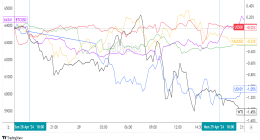ANYONE who’s self-employed but earning a low amount can get help through Universal Credit.
But some people receiving the benefit might find that their payments go down from next week because of something called “the minimum income floor”.
The minimum income floor is a threshold that’s used to calculate the maximum help that some self-employed people get through Universal Credit.
It was suspended during the coronavirus pandemic to help people whose income was taking a hit.
Effectively this meant that since March 2020, affected people have been granted a boost to their Universal Credit payments.
But the minimum income floor will come back in August, so people who are self-employed and getting Universal Credit could see their income change.
According to poverty charity Turn2us, the average cut to an affected worker’s benefit could be around £3,200 a year.
What is the Minimum Income Floor?
Essentially, the minimum income floor is the amount the government expects self-employed people to earn.
If the threshold applies to you, the government will calculate your Universal Credit payments based on this figure, rather than on how much money you actually made.
Everyone’s minimum income floor is different, and it depends on the number of hours you agreed to work with your work coach.
Each month, if you earn above the minimum income floor, your actual earnings will be used to work out your benefit.
If you fail to earn the minimum income floor, your welfare payments won’t be topped up, and you’ll be expected to work more to increase your income.
This could leave you short if you have an unexpected dip in earnings due to Covid-19 or a bad month for your business.
It’s well worth making sure you know what your minimum income floor is, so you know what the maximum Universal Credit you’ll get is – as this can help you to plan.
Who is affected by the minimum income floor?
The minimum income floor affects anyone who is in what the government calls “gainful self-employment.”
This means that your self-employment is your main job, you work regularly and you expect to make a profit.
It also only affects people who are in the “all work-related requirements group” – which you can check in your Universal Credit online account or by asking your work coach.
You might be in the all work-related requirements group when you shouldn’t be – for example, if you’re a carer or responsible for children.
You can if you’re in the right group or not here.
If you are in both gainful employment and the “all work-related requirements group” then you will be subject to the minimum income floor to calculate your benefits.
If you’ve just started a new business, you’ll usually begiven a year to settle in before the minimum income floor applies.
During this period, your benefit will be calculated based on what you actually earn, rather than what DWP expects you to earn.
How is the minimum income floor calculated?
The minimum income floor is worked out based on the number of hours you agreed to work with your work coach.
The government will assume that you earn at least minimum wage for each of the hours you promised to work.
This weekly rate will then be multiplied by 52 (the number of weeks in a year) and divided by 12 to give you a monthly figure.
For instance, if a 25 year old agreed to work 20 hours each week, at a national minimum wage of £8.91, their minimum income floor would be £772.20 a month.
If your minimum income floor is over £797, DWP might reduce it for tax and national insurance purposes.
Coronavirus help for the self-employed
HERE’S a round-up of the main coronavirus government schemes for the self-employed:
Hundreds of thousands of self-employed to be hit with extra charges due to tax return shake-up.
Who is eligible for the fourth self-employed grant?
Around 170,000 self-employed workers set to pay more tax from next month due to IR35 change – are you affected?









